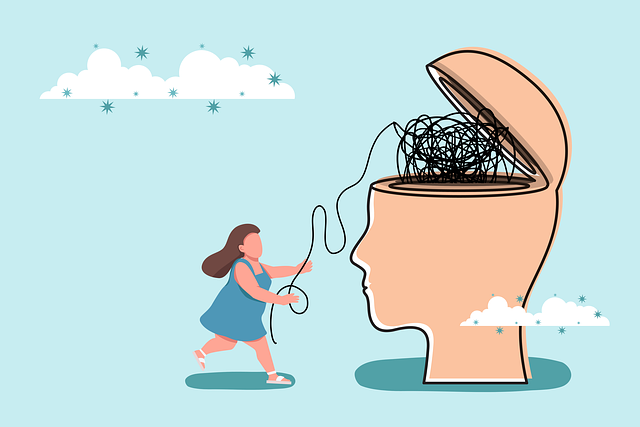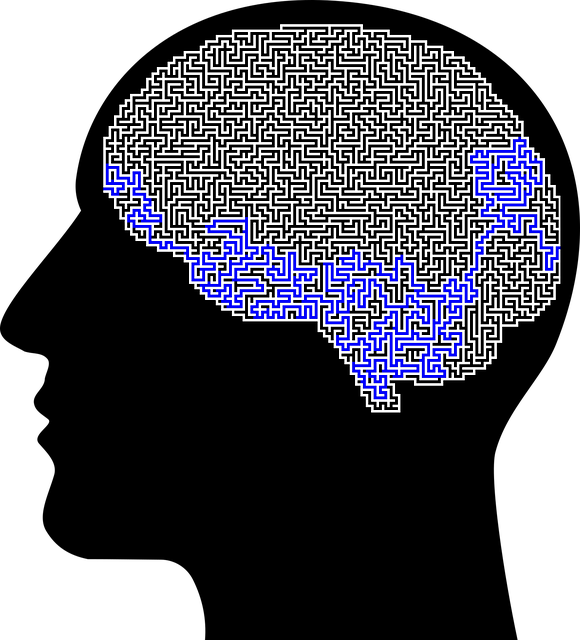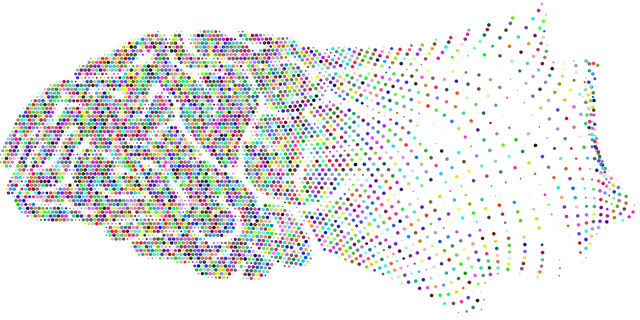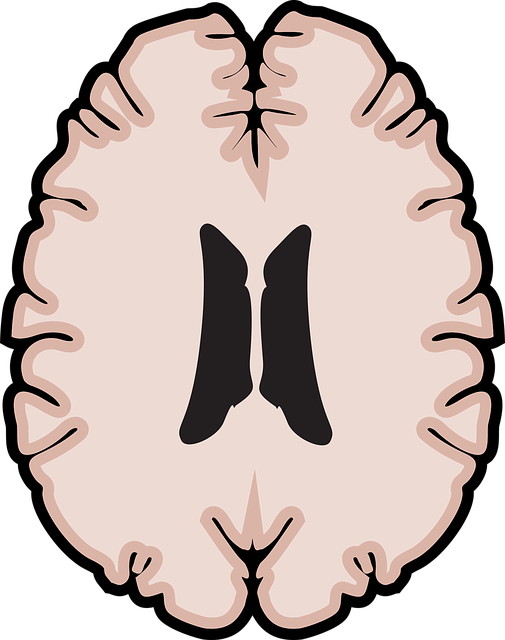Mental illness stigma in communities like Lakewood, driven by historical perceptions and lack of understanding, leads to discriminatory behaviors and silences individuals' experiences. Root causes include attributing mental illnesses to supernatural sources and modern societal stigma. Lakewood Spiritual-Religious Issues Therapy offers a pioneering approach by integrating faith with evidence-based practices, fostering empathy, breaking down barriers, and encouraging open dialogue. This holistic method combines spiritual beliefs with therapeutic sessions, self-care routines, and conflict resolution skills to empower individuals to embrace their spiritual journeys while prioritizing mental health. Educational initiatives, workshops, and podcasts are crucial for stigma reduction through knowledge empowerment, early intervention, mood management, and resilience building. A comprehensive strategy focusing on cultural sensitivity, provider burnout prevention, and mind over matter principles holds the key to eliminating stigma in mental healthcare.
Mental illness stigma remains a significant barrier to treatment, affecting millions globally. This article delves into comprehensive stigma reduction efforts, exploring root causes and impact. We examine the unique role of Lakewood Spiritual-Religious Issues Therapy in fostering understanding and acceptance. Discover effective communication strategies to break down barriers and empowering educational initiatives that arm communities with knowledge. Additionally, we share success stories and future directions towards a holistic elimination of mental illness stigma.
- Understanding Mental Illness Stigma: Root Causes and Impact
- The Role of Lakewood Spiritual-Religious Issues Therapy in Stigma Reduction
- Effective Communication Strategies to Break Down Barriers
- Educational Initiatives: Empowering Communities Through Knowledge
- Success Stories and Future Directions: A Holistic Approach to Stigma Elimination
Understanding Mental Illness Stigma: Root Causes and Impact

Mental illness stigma is a complex issue deeply rooted in societal perceptions and historical contexts. It often arises from a lack of understanding and fear of the unknown, leading to misinformed judgments and discriminatory behaviors. In many communities, including those dealing with spiritual-religious issues in Lakewood, mental health struggles are stigmatized, causing individuals to internalize shame and silence their experiences. This can have severe consequences, impacting not only an individual’s well-being but also hindering their ability to seek much-needed therapy.
The root causes of stigma are multifaceted. Historically, mental illnesses were often attributed to spiritual or supernatural sources, exacerbating the divide between physical and psychological health. Today, while scientific understanding has advanced significantly, the societal stigma persists, especially in communities where self-care routine development for better mental health is not prioritized. Compassion cultivation practices have shown promise in countering this stigma by fostering empathy and breaking down barriers. By encouraging open dialogue and promoting confidence boosting initiatives, individuals can navigate these challenges and find support through therapeutic means, ultimately improving access to care.
The Role of Lakewood Spiritual-Religious Issues Therapy in Stigma Reduction

Lakewood Spiritual-Religious Issues Therapy plays a pivotal role in stigma reduction efforts by addressing mental health concerns through a unique lens. This approach leverages the power of spiritual and religious beliefs to foster understanding and empathy within communities. By integrating faith with evidence-based therapeutic practices, Lakewood Spiritual-Religious Issues Therapy offers individuals a sense of comfort and support, challenging negative stereotypes often associated with mental illness.
Through public awareness campaigns, this therapy encourages open dialogues about mental health issues, emphasizing that spiritual struggles are valid components of overall well-being. Additionally, it promotes self-care routine development for better mental health, teaching individuals conflict resolution techniques to navigate challenges with resilience and grace. This holistic approach not only reduces stigma but also empowers individuals to embrace their spiritual journeys while prioritizing their mental health.
Effective Communication Strategies to Break Down Barriers

Stigma reduction efforts require effective communication strategies to break down barriers and foster understanding. One powerful approach is integrating emotional intelligence into conversations about mental health. By enhancing emotional awareness and empathy, individuals can better grasp the experiences of others, reducing judgment and promoting compassion. This, in turn, encourages open dialogue and creates a more supportive environment.
Additionally, social skills training plays a crucial role in bridging gaps associated with mental illness. Teaching individuals how to navigate social interactions with confidence and kindness helps dispel myths and promotes acceptance. trauma support services are also integral to these efforts, as they address the unique challenges faced by those who have experienced traumatic events, providing tools and resources for healing and integration into supportive communities, such as those found in Lakewood Spiritual-Religious Issues Therapy settings.
Educational Initiatives: Empowering Communities Through Knowledge

Educational initiatives play a pivotal role in reducing stigma surrounding mental illness by empowering communities with knowledge. Programs like Lakewood Spiritual-Religious Issues Therapy focus on raising awareness, dispelling myths, and fostering empathy. Through workshops, seminars, and accessible mental wellness podcast series production, individuals learn about various conditions, symptoms, and effective treatment options. This knowledge equips people to recognize signs in themselves or others, encouraging early intervention and support.
Moreover, these initiatives often emphasize the importance of mood management and resilience building. By providing practical tools and strategies, communities gain a better understanding of how to navigate mental health challenges. Such efforts not only reduce fear and misunderstanding but also foster an environment where individuals feel safe seeking help without fear of judgment.
Success Stories and Future Directions: A Holistic Approach to Stigma Elimination

Mental illness stigma reduction efforts have seen notable success stories, with many individuals finding healing and support through innovative approaches. In Lakewood, for instance, spiritual-religious issues therapy has emerged as a powerful tool in combating mental health stigmas within diverse communities. This holistic practice not only acknowledges the interconnectedness of mind, body, and spirit but also respects cultural sensitivities in mental healthcare, fostering an inclusive environment that encourages open dialogue and understanding.
Looking ahead, the future of stigma elimination lies in a comprehensive strategy that incorporates cultural sensitivity in mental healthcare practices, burnout prevention for healthcare providers, and the application of mind over matter principles. By integrating these aspects, we can create a more supportive ecosystem where individuals are empowered to seek help without fear of judgment. This holistic approach promises to revolutionize mental healthcare, making it accessible, compassionate, and ultimately, life-changing for those navigating their mental health journeys.
Mental illness stigma reduction is a multifaceted endeavor, requiring a holistic approach that includes understanding root causes, effective communication strategies, educational initiatives, and empowering communities. As highlighted by success stories in Lakewood Spiritual-Religious Issues Therapy, collaborative efforts across sectors can significantly mitigate the impact of mental health stigma. By fostering open dialogue, promoting knowledge, and embracing diverse perspectives, we can create a more inclusive society where individuals with mental illness feel supported and empowered to seek help without fear of judgment or discrimination.














